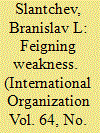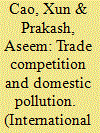|
|
|
Sort Order |
|
|
|
Items / Page
|
|
|
|
|
|
|
| Srl | Item |
| 1 |
ID:
097720


|
|
|
|
|
| Publication |
2010.
|
| Summary/Abstract |
Theory and empirical evidence show that low inflation is a precondition for economic growth. Independent central banks and fixed exchange rates are institutional mechanisms that help keep inflation low by lending monetary policy credibility to governments. However, the two institutions are commonly analyzed as substitutes that tie the hands of inflation prone governments. Thus, the literature has difficulties describing why governments would adopt both institutions and the interaction between them. This paper presents a model that allows policymakers the simultaneous choice of monetary institutions and shows that imperfectly credible institutions will overlap: when exchange rates are fixed but adjustable and central bank independence is not fully ascertainable, governments choose both institutions. More generally, the paper generates hypotheses about the conditions that make fixed exchange rates and independent central banks complements or substitutes, thus contributing to an explanation of the diversity of global monetary institutions in the post-Bretton Woods period.
|
|
|
|
|
|
|
|
|
|
|
|
|
|
|
|
| 2 |
ID:
097718


|
|
|
|
|
| Publication |
2010.
|
| Summary/Abstract |
In typical crisis bargaining models, strong actors must convince the opponent that they are not bluffing and the only way to do so is through costly signaling. However, in a war, strong actors can benefit from tactical surprise when their opponent mistakenly believes that they are weak. This creates contradictory incentives during the pre-war crisis: actors want to persuade the opponent of their strength to gain a better deal but, should war break out, they would rather have the opponent believe they are weak. I present an ultimatum crisis bargaining model that incorporates this dilemma and show that a strong actor may feign weakness during the bargaining phase. This implies that (1) absence of a costly signal is not an unambiguous revelation of weakness, (2) the problem of uncertainty is worse because the only actor with incentives to overcome it may be unwilling to do so, and (3) because of the difficulty with concealing resolve, democracies might be seriously disadvantaged in a crisis.
|
|
|
|
|
|
|
|
|
|
|
|
|
|
|
|
| 3 |
ID:
097719


|
|
|
|
|
| Publication |
2010.
|
| Summary/Abstract |
Existing research on foreign direct investment (FDI) focuses on how politics influences the supply of FDI inflows. In this article I shift focus to the demand for FDI inflows within recipient countries by examining individual preferences for FDI. I argue that FDI preferences are largely a function of FDI's effects on income. FDI raises wages, especially those of skilled labor because foreign firms require more highly skilled labor than their local counterparts. Accordingly, support for FDI should increase with respondents' skills. Using three years of extensive public opinion data from eighteen Latin American countries, I provide robust evidence that preferences are consistent with FDI's effects on income. There is relatively little support for alternate explanations including concerns about job security, opposition to privatization, and the socializing effects of higher education on economic policy preferences.
|
|
|
|
|
|
|
|
|
|
|
|
|
|
|
|
| 4 |
ID:
097721


|
|
|
|
|
| Publication |
2010.
|
| Summary/Abstract |
Prevailing theories hold that U.S. public support for a war depends primarily on its degree of success, U.S. casualties, or conflict goals. Yet, research into the framing of foreign policy shows that public perceptions concerning each of these factors are often endogenous and malleable by elites. In this article, we argue that both elite rhetoric and the situation on the ground in the conflict affect public opinion, but the qualities that make such information persuasive vary over time and with circumstances. Early in a conflict, elites (especially the president) have an informational advantage that renders public perceptions of "reality" very elastic. As events unfold and as the public gathers more information, this elasticity recedes, allowing alternative frames to challenge the administration's preferred frame. We predict that over time the marginal impact of elite rhetoric and reality will decrease, although a sustained change in events may eventually restore their influence. We test our argument through a content analysis of news coverage of the Iraq war from 2003 through 2007, an original survey of public attitudes regarding Iraq, and partially disaggregated data from more than 200 surveys of public opinion on the war.
|
|
|
|
|
|
|
|
|
|
|
|
|
|
|
|
| 5 |
ID:
097722


|
|
|
|
|
| Publication |
2010.
|
| Summary/Abstract |
This research note examines whether trade competition abets regulatory races in the environmental area. To analyze trade competition, we develop a new measure, structural equivalence, which assesses competitive threats that a country faces from other countries whose firms export the same products to the same destination countries. Employing this new measure, we analyze air pollution intensity (sulfur dioxide or SO2) and water pollution intensity (biochemical oxygen demand or BOD) for a panel of 140 countries for the time period 1980-2003. We find that trade competition is a significant predictor of water pollution intensity among structurally equivalent countries. We then test separately whether trade competition abets upward and downward regulatory races. We find that in the case of water pollution, countries respond symmetrically to downward and upward races, that is, they follow their structurally equivalent competitor countries both when they ratchet down their regulations and when they ratchet up regulations. In the case of air pollution, however, countries are responsive to downward policy changes only in competitor countries.
|
|
|
|
|
|
|
|
|
|
|
|
|
|
|
|
| 6 |
ID:
097723


|
|
|
|
|
| Publication |
2010.
|
| Summary/Abstract |
Cross-border cooperation among domestic regulators and public officials has become a defining feature of global governance. While a number of studies have tracked the emergence and institutionalization of such transgovernmental networks, less is known about their effect on domestic policy. This study explores this link for the important case of insider-trading regulation in original data for 116 countries between 1977 and 2006. It offers quantitative evidence that transgovernmental cooperation is related to domestic policy convergence but that the relationship is more complex than often assumed. Direct ties to powerful regulators increases a jurisdiction's likelihood of adopting internationally promoted policies such as insider-trading rules. Separately, membership in the International Organization of Securities Commissions (IOSCO), a forum designed to diffuse best practices among regulators, increases a jurisdiction's likelihood of subsequently enforcing newly adopted policies. The findings in this study suggest that different network components are associated with distinct aspects of domestic policy convergence. The results are directly relevant for current public policy debates about the reregulation of global financial markets as transgovernmental networks among domestic regulators have assumed a critical role.
|
|
|
|
|
|
|
|
|
|
|
|
|
|
|
|
|
|
|
|
|